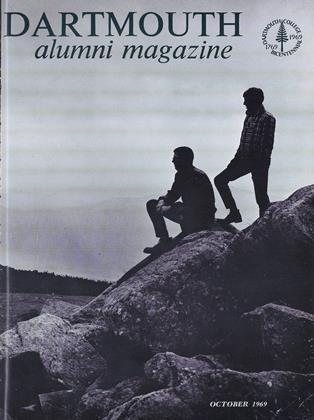ALL THE BEST IN BRITAIN, INCLUDING ENGLAND, WALES, SCOTLAND AND NORTHERN IRELAND, WITH ILLUSTRATIONS AND MAPS.
OCTOBER 1969 JOHN HURD '21ALL THE BEST IN BRITAIN, INCLUDING ENGLAND, WALES, SCOTLAND AND NORTHERN IRELAND, WITH ILLUSTRATIONS AND MAPS. JOHN HURD '21 OCTOBER 1969
By SydneyClark '12. New York: Dodd, Mead &Company, 1969. 526 pp. $7.95.
The rain which falls in London is not like other rain; you're drenched with long ago. For that reason Mr. Clark loves London, but he also loves it because when the sun shines, London is drenched with youth. If Britain has renounced the greatness of empire, it has achieved the greatness of wise restraint free from power politics and nationalistic ambitions. Its verve has gone into the variety of civilized manners, gracious willingness to listen even to university rebels and beatniks and flower children in Trafalgar Square, courteous discipline involving queuing for buses and taxis (utterly different from American shove and grab), oldstyle taxis and old-style pubs, theatres classic and modern, restaurants now beginning to rival those of Paris and Copenhagen, lawns and gardens, and outdoor concerts all over and choral music indoors in Westminster Abbey.
Patriotic Parisians proclaim Paris as France; all else is merely bovine and vinous provinces providing food and drink for the capital. Londoners echo Samuel Johnson's eloquence about London,' but they do not cast a supercilious eye on the rest of England, Wales, Scotland, or even Northern Ireland, which no fewer than ten American heads of state have looked to as their ancestral land. The ten presidents are Jackson, Polk, Buchanan, Andrew Johnson, Grant, Arthur, Cleveland, Harrison, McKinley, and Wilson.
Samuel Johnson might well approve Mr. Clark's emphases: London and day trips from it, 315 pages; travelling in England south, north, and west, 54; Wales, 18; English Lakes for poetry and pleasure, 10; the North known as "The Drier Side," 19; Scotland, 83; and Northern Ireland, 8.
Time describes Mr. Clark as the man who "loves to send his readers to spots other guides ignore." Read Clark and you may be sure that a brolly is an umbrella, pricey is expensive, a wireless is a radio, a subway is a pedestrian passage, bends are curves in the road, a flyover is an overpass, and a lay-by is a rest area. Read Clark and you will have at your finger tips not only the names of all British sovereigns and their dates but also the reasons why the House of Tudor was high-handed. You will not mispronounce Berkeley, you will enter a pub before the woman you are escorting and you will not tip the bartender.
Are you curious about the church in which Becket was murdered, Shanklin on the Isle of Wight, Warwick Castle and the Age of Chivalry, the 200 vintage automobiles in Beaulieu (pronounce it Bewley, please), Pultney Bridge in Bath, Chipping Campden and medieval England, and Caernarvon Castle where the first Prince of Wales, later Edward 11, was born in 1284 and where Prince Charles was proclaimed in 1969?
Read Sydney Clark, the man for your fireside, ocean liner or jet plane and for your Britain which was, is, and will be.
 View Full Issue
View Full Issue
More From This Issue
-
 Feature
FeatureThird Century Fund Launches General Campaign Among Alumni
October 1969 -
 Feature
FeatureThe Transcending Great Issues
October 1969 -
 Feature
FeatureA Scientific Centennial for Dartmouth
October 1969 By ALLEN L. KING -
 Feature
FeatureWhitewater Racing Gains New Status
October 1969 By JAY EVANS '49 -
 Feature
FeatureBicentennial Draws Unusual Gifts
October 1969 -
 Article
ArticleWith the Big Green Teams
October 1969
JOHN HURD '21
-
 Books
BooksEVERY DOG SHOULD HAVE A MAN.
December 1952 By John Hurd '21 -
 Article
Article"Ma" Smalley's Club Razed, But the Memories Live On
May 1954 By JOHN HURD '21 -
 Books
BooksTHE PREVALENCE OF NONSENSE.
NOVEMBER 1967 By JOHN HURD '21 -
 Books
BooksFIELDS OF GRACE.
APRIL 1973 By JOHN HURD '21 -
 Books
BooksTHE YOUNG MILLIONAIRES.
October 1973 By JOHN HURD '21 -
 Books
BooksVice in Its Gayest Colors
June 1975 By JOHN HURD '21








